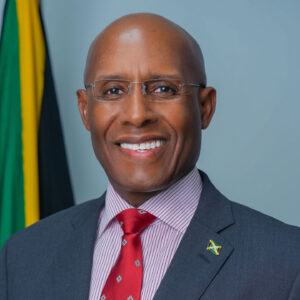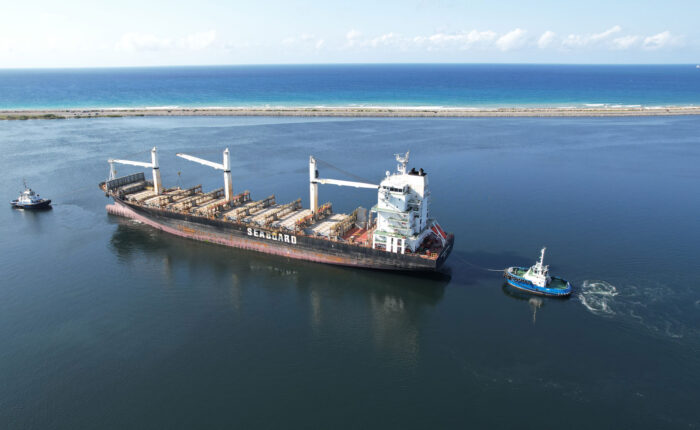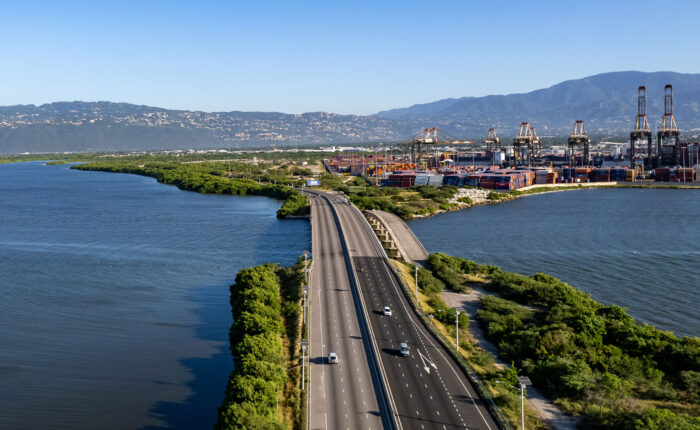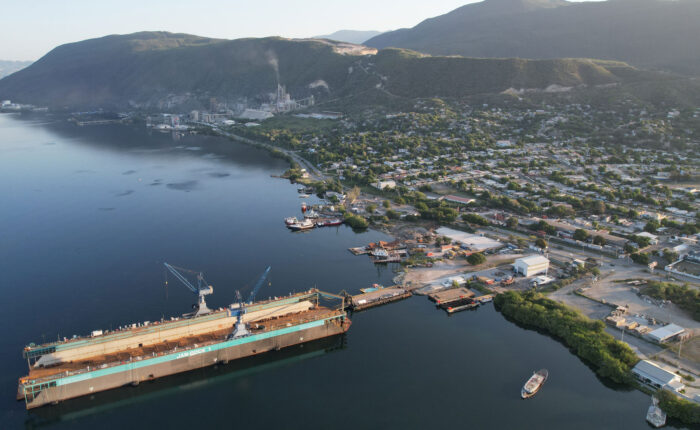Jamaica’s remarkable economic turnaround under Prime Minister Andrew Holness continues to gather steam. With firm foundations in place, now the government is opening investment opportunities to build on its progress.
Jamaica’s notable economic progress in recent years has captured the attention of investors across the globe. The nation’s debt-to-GDP ratio has been cut from 147% to 74%—the lowest level in 25 years—bringing the target of 56% within reach. This has enabled the country to better weather recent global macroeconomic shocks and reinvigorated growth expectations. “We have transformed our economy from what was once deemed a ‘basket case’ to an IMF ‘poster child’,” says Minister of Industry, Investment and Commerce Aubyn Hill. “Through prudent management, we have restored fiscal stability across eight consecutive budgets without raising taxes or borrowing to weather challenges.”
Reforms under the administration of Andrew Holness include the establishment of an independent central bank, the creation of the Fiscal Accountability Committee, and the enactment of the Financial Accounting and Audit Act—all designed to ensure financial discipline and resilience for the long term. Meanwhile, the appointment of Finance Minister Nigel Clarke as deputy managing director of the IMF underscores the nation’s burgeoning reputation in the global financial arena.
“Jamaica now boasts strong fundamentals,” Hill continues. “We speak English, have no currency controls, and maintain a legal system which appeals to investors accustomed to British or New York law. Our young workforce, proximity to the U.S. market, and commitment to transparent, compliant business practices make Jamaica an increasingly attractive destination for global investment.”

Aubyn Hill boasts over 35 years’ experience in international banking, including 21 years spent in the Middle East. His extensive government service includes previous roles in the Ministry of Economic Growth and Job Creation and as CEO of the Prime Minister’s Economic Growth Council.
Q: What is your strategy for advancing Jamaica’s business and investment landscape?
Over the past seven years, we have significantly improved our fiscal health, reducing our debt-to-GDP ratio and recording 20 quarters of growth before the pandemic and 12 quarters since. Moving forward, our focus will shift toward expanding exports of goods and services.
Services will be vital. To compete, we need a skilled workforce, so we are aiming to enhance educational efficiency to better prepare our people. Tourism is another strong sector, with 20,000 new hotel rooms planned and expansions like a new airport in Negril recently announced. Additionally, we are evolving our business process outsourcing sector into knowledge processing outsourcing (KPO), aiming to make Jamaica the leading KPO hub in the Caribbean and Latin America.
Q: What benefits arise from Jamaica’s strengthened ties with the UAE and Middle East?
For investors from the Middle East, Jamaica offers an appealing legal system based on English law, with direct ties to London. Additionally, we are promoting Jamaica as an ideal logistics and travel hub. With a largely underused airport capable of accommodating large aircraft, Middle Eastern airlines could establish a Kingston hub, facilitating travel for those with visas to the US and offering alternative routes throughout Latin America and the Caribbean for those without.
Jamaica’s geographic location near the Panama Canal also makes it a prime logistics centre. We are actively seeking investment in ports and special economic zones (SEZs) to support logistics operations across the Caribbean, and our position also enables easy shipping to both Europe and Latin America.
With Guyana’s booming oil industry and rapid growth, there is also an opportunity for Jamaica to become a logistics hub for oil services. Additionally, Jamaica’s strategically protected port in Kingston is an ideal destination for Middle Eastern investors looking to establish a logistics centre that serves the Caribbean and Latin America, not only for oil services but for consumer goods as well.
Q: What advantages does Jamaica’s SEZ offer to UAE investors?
The SEZ framework offers substantial tax incentives, with designated areas, such as a 580-acre site adjacent to the Kingston port where qualified “master investors” can become master developers, granting them a 50-year renewable lease. Master developers, and their logistics tenants, will benefit from up to 50 years of tax-free rental income. Furthermore, after the initial years, any income from reinvested profits will be taxed at only half the standard corporate rate, with further reductions for those who hire and train local Jamaicans.
Q: How can partnerships with UAE companies help Jamaican businesses boost efficiency?
Small businesses often grow through partnerships with larger companies, but they cannot rely solely on outside help. They must upskill their workforce, embrace new competencies, and prioritise digital transformation to ensure efficiency.
A highly trained workforce is crucial. Jamaica has only three million people, so we need every individual to be well-trained. We have made substantial progress in transforming Jamaica’s economy, and we are committed to investing in our people to reach even greater heights.

With expert guidance and dedicated programs, JAMPRO is helping bring Jamaican products and services to the world—and investors to Jamaica.
As Jamaica’s investment promotion agency, JAMPRO takes pride in acting as a one-stop shop for information and services, guiding investors through the decision-making process and execution of investments in the nation’s flourishing economy. “We offer a suite of services, all free and subsidised by the Jamaican government, enabling us to collaborate effectively with other government agencies to ensure a seamless investor experience,” explains JAMPRO President Shullette Cox. “Engaging with us allows companies to quickly understand the local landscape—specific to their sector—and navigate the necessary steps to establish their business in Jamaica.”
Tasked with the dual mandate of investment and export promotion, JAMPRO plays a broad role connecting investors with local businesses. The Linkages Program, for example, enables investors to discover goods and services available in Jamaica, facilitating business partnerships both domestically and abroad. Export Max, meanwhile, is an internationally recognised program that helps strengthen exporters and export-ready small and medium enterprises by offering expertise and guidance, such as market penetration and business development. “This program is to help participants gain a clear understanding of global markets and how to position themselves within them,” says Cox. “Naturally, the UAE plays a significant role in this strategy.”
Government initiatives to diversify Jamaica’s economy have surfaced opportunities across the business spectrum, from logistics and agricultural processing to tourism and an expanding tech sector. “Jamaica’s economy is exceptionally strong, a testament to government efforts over the past decade,” concludes Cox. “With these foundational achievements in place, the government is now prioritising growth, industry development and human capital advancement.”

Q: What is your growth strategy for Jamaica in the medium term?
Jamaica’s strategic business plan focuses on four key areas: agribusiness, tourism, global digital services, and logistics. Strengthening linkages between tourism and exports, particularly with the UAE, is a key strategy.
Q: What opportunities exist in those areas for UAE investors?
The tourism sector is evolving, with efforts to attract high-end luxury brands familiar in the UAE. Infrastructure upgrades are making Jamaica’s eastern coast more accessible, opening new avenues for investment and development. This region is poised to cater to luxury tourists, offering unique opportunities for UAE investors to participate in its transformation.
Logistics presents the greatest opportunity for UAE investment. Jamaica’s central location in the Caribbean makes it a natural hub for logistics and manufacturing. The country’s position supports just-in-time delivery of goods; UAE manufacturers could send unfinished products to Jamaica for final customisation before delivery to US markets within a week.
Q: What role can UAE partnerships play in boosting Jamaica’s economy?
We see immense potential, particularly in the services sector, to expand offerings to the UAE. A recent example highlights this potential, as an article about a tech company in our Export Max Program detailed their collaboration with a UK company to deliver services to the Ministry of Tourism in Dubai.

The Jamaica Special Economic Zone Authority (JSEZA) regulates and facilitates investment in the nation’s SEZs, providing key support and guidance.
JSEZA is mandated to drive economic growth through the provision of incentives and facilitation services that create a robust business environment in Jamaica. Since the Authority’s inception in 2016, Jamaica has seen an increase in the diversification of industries entering and growing under the SEZ regime. This has been accompanied by the launch of a dedicated Business Acceleration Centre, enabling the provision of closer guidance to clients. “While we serve as regulators, our foremost role is to facilitate,” says CEO Kelli-Dawn Hamilton. “This partnership approach means we must deeply understand our clients’ businesses to offer the best support.” The centre’s success sees JSEZA planning to replicate the model in additional locations.
This has been matched by an increase in the number of investors using the zones, spurred by government-led trade missions and aided by deals such as the UAE Corporation Investment Agreement, paving the way for UAE-Jamaica business partnerships. Here, Hamilton expands on JSEZA’s vital work.


Q: What are your key goals as CEO?
We are focused on advancing the goals of our clients, including growing our SEZs by facilitating business opportunities, particularly in new markets. We have 202 approved SEZ locations across the island, occupying over 26 million square feet of land space.
Q: How does JSEZA streamline entry for investors, particularly from the UAE?
We encourage investors to approach us at the idea stage. Our support services help us connect applicants with other government entities key to their application, which reduces timelines, especially as the Jamaican government has prioritised SEZ developments. For UAE investors, our approach will be the same. We are focusing on three categories of UAE-based businesses: financiers, infrastructure developers and companies that will occupy SEZ spaces, in sectors such as manufacturing, logistics and shipping, global digital services and agro-processing.
Q: How does JSEZA leverage recent Jamaica-UAE agreements?
Following 2020 World Expo in Dubai, we saw over 5,000% growth in export value to the UAE from 2021 to 2022, indicating a strong demand for Jamaican goods and services there—a demand we are keen to leverage. Additionally, our geographic position gives us the advantage of being a hub for the UAE in this region, which we continue to promote.
